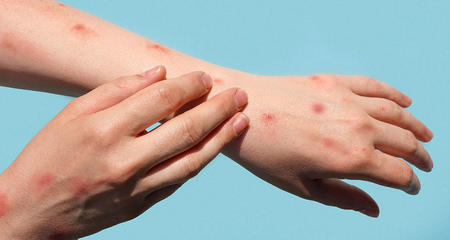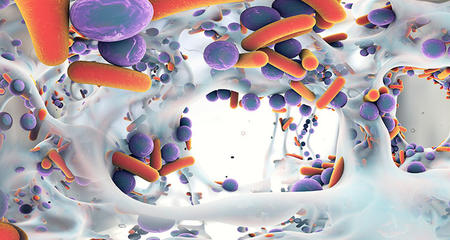What Is Human Immunodeficiency Virus (HIV)?
Human immunodeficiency virus (HIV), if untreated, attacks and weakens your immune system — progressing to acquired immune deficiency syndrome (AIDS). The virus weakens your ability to fight infections and cancer by infecting and killing CD4 cells (also called T cells).
Stages of HIV
The three stages of HIV infection and their symptoms are:
- Acute HIV Infection: The first stage of HIV infection occurs within two to four weeks of exposure. You might develop flu-like symptoms — fever, rash or headache. The virus attacks your immune system — destroying the cells that fight infection. During this phase, the level of HIV is very high in your body fluids. This increases the risk of transmitting HIV to someone else. As with many conditions, early treatment during this stage can improve your long-term health.
- Chronic HIV Infection: Many patients do not have any symptoms in the second stage. The virus continues to multiply in your blood, but at a lower level than in acute HIV infection. This second stage can last for years or decades. While HIV multiplies slower in this phase, if untreated, it continues to attack your immune system and cause long-term damage. Taking medications for HIV can reduce or prevent any negative impacts on your health.
- Acquired Immunodeficiency Syndrome (AIDS): In this last, and most serious stage, HIV compromises your immune system so much that it cannot fight off infections that a person with a healthy immune system fights off normally. These are called “opportunistic infections” and include some types of cancer, pneumonia and bacterial infections.
HIV Screening
About one out of seven people living with HIV do not know they have HIV. This means they could unknowingly transmit the disease to others. They are also missing out on treatments that could help them live a long, healthy life.
An HIV test is the only way to know whether you have HIV. It’s important to get tested if you haven’t had a test before and to get tested regularly if you are at risk for HIV. There are three possible test results.
- A negative test result means that a person probably doesn’t have HIV. However, if a person has been very recently exposed to HIV, such as in the past 10 – 14 days, it may be too soon to find out if the person has HIV. Re-testing may be necessary.
- A positive test result means that the test detected HIV in a person’s blood.
- An indeterminate test result is neither negative nor positive. This means that an additional test is needed to confirm whether the person has HIV.
HIV tests are among the most accurate lab tests, but no test is 100% accurate. Additional testing may be needed or recommended. Your test results are available in the Froedtert & MCW app and MyChart. You may be contacted by a member of your care team if you need follow-up testing or care.
If you test positive, our HIV Care and Prevention Program is here to help answer questions about your HIV test. You can reach them at 414-805-6444.
State law permits only a very limited number of people to know if someone is living with HIV. Positive HIV test results are reported to public health officials. Strict state laws safeguard confidential information on HIV.
HIV Treatment
There is currently no cure for HIV.
Antiretroviral therapy (ART), however, can control HIV and prevent the health problems that can result from untreated HIV. ART is a combination of medicines that fight HIV that you take as part of a treatment regimen every day. The goal is to stop HIV from reproducing in your body — lowering its effect on your immune system and decreasing the risk of passing HIV to others.
HIV treatment can result in a normal lifespan and reduce the chance of health problems from HIV. The number of deaths from HIV has decreased steadily around the world during the current era of effective ART and increased access to ART. In Wisconsin and most states, ART is immediately available to every person diagnosed with HIV.
HIV Prevention
If you are not HIV positive, there are things you can do to prevent HIV infection.
- HIV PrEP (pre-exposure prophylaxis) is a medication that can be taken on a regular basis to reduce the risk of HIV infection. Talk to your doctor about HIV PrEP.
- Wear latex condoms properly when you have sex. Don't use condoms made from animal products.
- Use water-based lubricants (lube). Other lubricants can degrade the condom material making it more prone to leaks and tears.
- If you inject drugs, use clean needles.
- Avoid getting drunk or high as it can lower your inclination to protect yourself.
HIV Risk Behaviors
HIV is mainly transmitted through:
- Vaginal sex and anal sex. Using PrEP can drastically reduce the chance of HIV transmission during sex. Condoms and also reduce the likelihood of HIV transmission.
- Injecting drugs with non-sterile needles. PrEP can also reduce the chance of HIV transmission among people who inject drugs.
- Pregnancy and delivery. HIV testing of pregnant people allows them, if they are HIV positive, to take antiretroviral medications to reduce the likelihood they will pass HIV to their child.
- Breast feeding. Usually, formula feeding is recommended for infants born to people who have HIV. This can be discussed with your obstetrician.
Barriers to HIV Prevention
Some people living with HIV or at risk for HIV may have less access to preventive care, testing and treatment regimens. They may also live in an environment that makes it difficult to talk about HIV infection. Specific factors include:
- Lack of financial resources
- Lack of convenient, affordable health care
- Fear of violent reactions from partners, particularly for those abusive relationships
- Less access to transportation
- Homelessness, making it difficult to stick with treatment regimens, store medications and eat consistently healthy meals
- Lack of emotional or physical support
- Added responsibility of caring for others, especially children, that can make it difficult to care for themselves and take their medicines
- Fear of telling their family about their HIV
Fortunately, there are resources available for people who are diagnosed with HIV to help them overcome many of these challenges.


